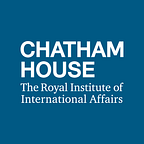The Week at Chatham House: Gender Equality, Weaponizing Health and is US Moral Authority in Decline?
The latest international news and analysis this week.
Is US Moral Authority in Decline?
This weekend will see President Donald Trump complete his first 100 days in the world’s top job. Yet the biggest surprise to most will be the degree to which his tenure so far has been normalized argues Leslie Vinjamuri.
Few US policies have been significantly changed as promised by Trump during his election campaign — and as feared by many — however Trump’s preference for hard power could spell trouble for America’s foreign relations.
While the recent US missile strikes on Syria were supported by domestic audiences and by allies, they breached international law, writes Ben Saul. But who would take over the job of ethical enforcer if the US cannot keep hold of the title?
#SheCanWeCan
It’s competition time at Chatham House as the International Economics Department this week launched its #SheCanWeCan gender equality video competition.
In a century where more women than men are living in poverty in both developing and developed countries — with women and girls representing over 50 per cent of the number of people living in low-income households — closing the gender gap has never been more economically crucial.
Chatham House has been working closely with countries hosting the G20 as part of its Gender and Growth Initiative to raise awareness around gender equality issues and ensure that it is included in discussions over economic growth targets.
This year’s video competition — open to 18–25 year olds around the world — is looking for innovative ideas to make the world a better place for women. If you fit the bill, why not enter, and you could join global leaders in London at the Chatham House International Policy Forum on 10–11 July 2017.
The ‘Weaponization of Health’
Following the recent alleged use of chemical weapons in Syria, the bombing of the hospital where the victims were taken to has been overlooked by the international community, despite being a potential violation of international humanitarian law, argues Rachel Thompson.
As the war in Syria rages on, questions over how to protect those wounded in the war, and in conflicts around the world, has never been more timely: the ‘laws of war’, established over 100 years ago, safeguard medical facilities, doctors and patients during battle, however, with the so-called rise in the ‘weaponization of health’, is it time for the international community to do more to protect healthcare in conflict- and war-torn areas?
Exploring the Global Trade in Natural Resources
Since the Second World War, global food trade has rapidly increased, with the value of agricultural products being traded today standing at $1.1 trillion.
The volume of natural resources traded globally — from crops to metals to gemstones — has increased over 60 per cent since the turn of the century, bringing new environmental and social challenges as well as opportunities.
Now everyone can explore these fast-evolving dynamics through resourcetrade.earth — Chatham House’s major new microsite offering comprehensive and accessible data and insights into resource trade.
